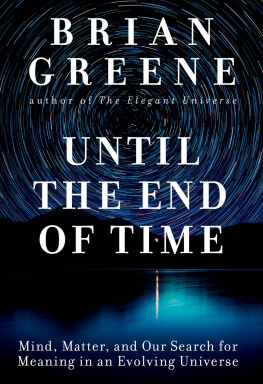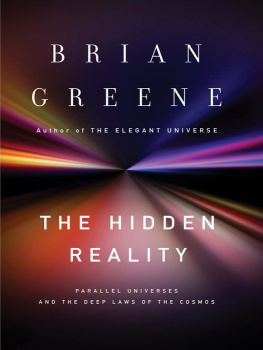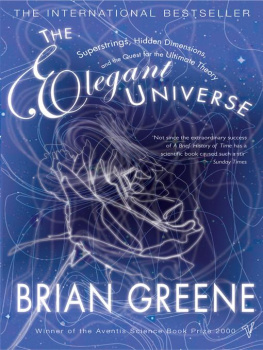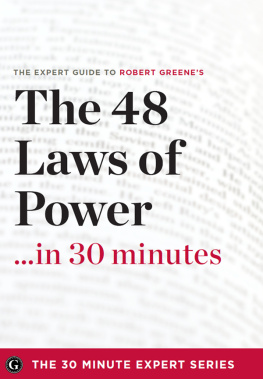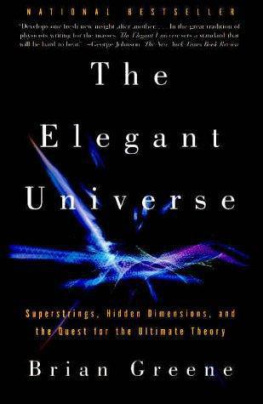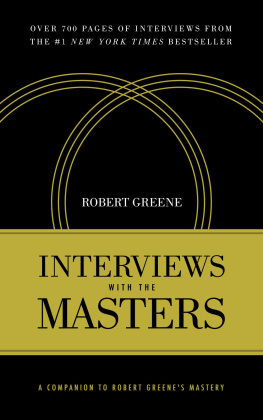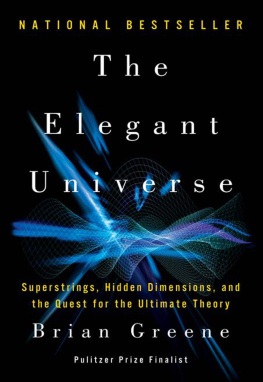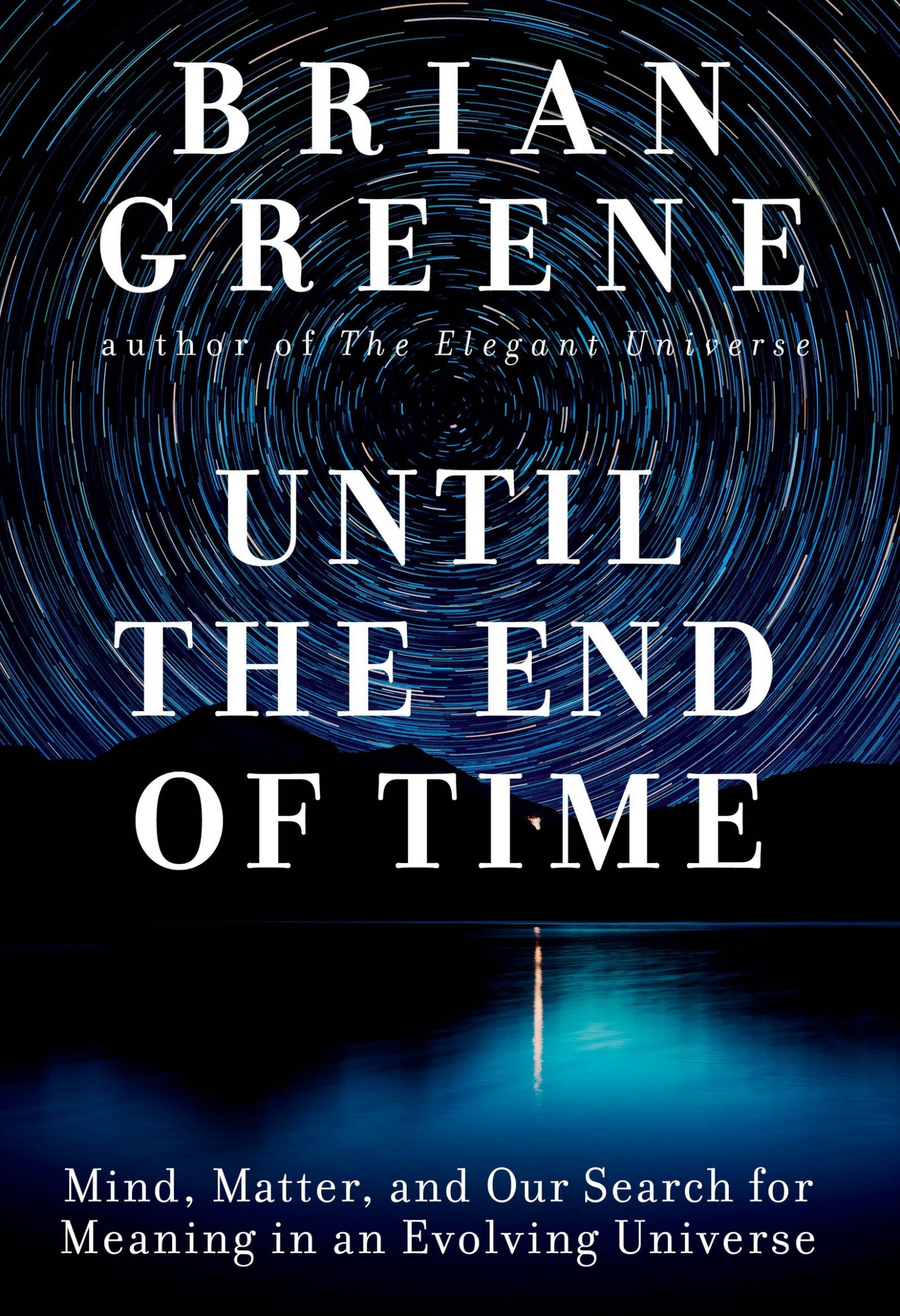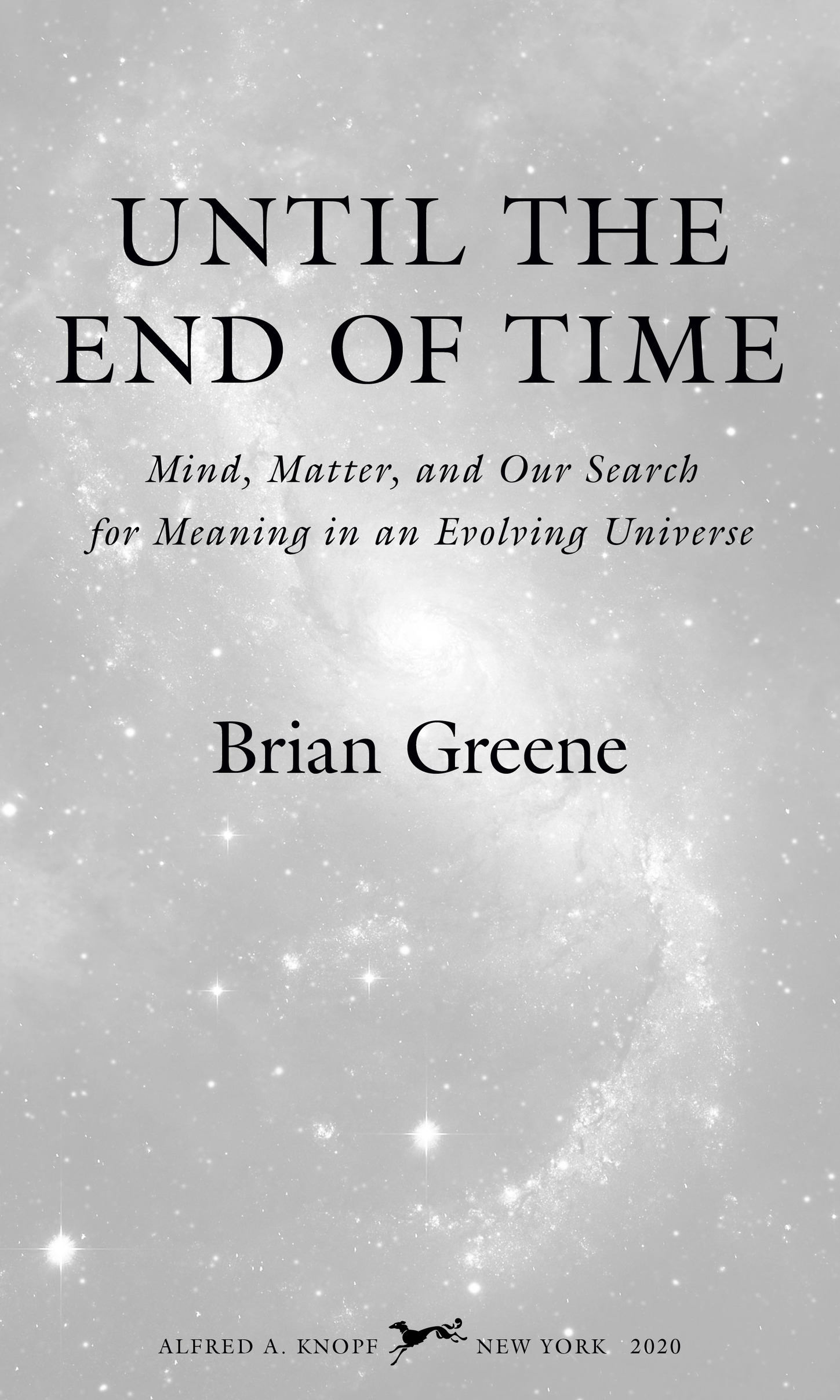ALSO BY BRIAN GREENE
The Hidden Reality
The Fabric of the Cosmos
The Elegant Universe
THIS IS A BORZOI BOOK PUBLISHED BY ALFRED A . KNOPF
Copyright 2020 by Brian Greene
All rights reserved. Published in the United States by Alfred A. Knopf, a division of Penguin Random House LLC, New York, and distributed in Canada by Penguin Random House Canada Limited, Toronto.
www.aaknopf.com
Knopf, Borzoi Books, and the colophon are registered trademarks of Penguin Random House LLC.
Library of Congress Cataloging-in-Publication Data
Names: Greene, B. (Brian), [date] author.
Title: Until the end of time : mind, matter, and our search for meaning in an evolving universe / Brian Greene.
Description: First edition. | New York : Alfred A. Knopf Books, 2020. | Includes bibliographical references and index.
Identifiers: LCCN 2019022442 (print) | LCCN 2019022443 (ebook) | ISBN 9781524731670 (hardcover) | ISBN 9781524731687 (ebook)
Subjects: LCSH: Cosmology. | PhysicsPhilosophy.
Classification: LCC QB981 .G7434 2020 (print) | LCC QB981 (ebook) | DDC 523.1dc23
LC record available at https://lccn.loc.gov/2019022442
LC ebook record available at https://lccn.loc.gov/2019022443
Ebook ISBN9781524731687
Cover photograph by shaunl/E+/Getty Images
Cover design by Chip Kidd
ep_prh_5.4_c0_r1
For Tracy
Contents
Preface
I do mathematics because once you prove a theorem, it stands. Forever. The statement, simple and direct, was startling. I was a sophomore in college and had mentioned to an older friend, who for years had taught me vast areas of mathematics, that I was writing a paper on human motivation for a psychology course I was taking. His response was transformative. Until then, I hadnt thought about mathematics in terms even remotely similar. To me, math was a wondrous game of abstract precision played by a peculiar community who would delight at punch lines turning on square roots or dividing by zero. But with his remark, the cogs suddenly clicked. Yes, I thought. That is the romance of mathematics. Creativity constrained by logic and a set of axioms dictates how ideas can be manipulated and combined to reveal unshakable truths. Every right-angled triangle drawn from before Pythagoras and on to eternity satisfies the famous theorem that bears his name. There are no exceptions. Sure, you can change the assumptions and find yourself exploring new realms, such as triangles drawn on a curved surface like the skin of a basketball, which can upend Pythagorass conclusion. But fix your assumptions, double-check your work, and your result is ready to be chiseled in stone. No climbing to the mountaintop, no wandering the desert, no triumphing over the underworld. You can sit comfortably at a desk and use paper, pencil, and a penetrating mind to create something timeless.
The perspective opened my world. I had never really asked myself why I was so deeply attracted to mathematics and physics. Solving problems, learning how the universe is put togetherthats what had always captivated me. I now became convinced that I was drawn to these disciplines because they hovered above the impermanent nature of the everyday. However overblown my youthful sensibilities rendered my commitment, I was suddenly sure I wanted to be part of a journey toward insights so fundamental that they would never change. Let governments rise and fall, let World Series be won and lost, let legends of film, television, and stage come and go. I wanted to spend my life catching a glimpse of something transcendent.
In the meantime, I still had that psychology paper to write. The assignment was to develop a theory of why we humans do what we do, but each time I started writing, the project seemed decidedly nebulous. If you clothed reasonable-sounding ideas in the right language it seemed that you could pretty much make it up as you went along. I mentioned this over dinner at my dorm and one of the resident advisors suggested I take a look at Oswald Spenglers Decline of the West. A German historian and philosopher, Spengler had an abiding interest in both mathematics and science, no doubt the very reason his book had been recommended.
The aspects responsible for the books fame and scornpredictions of political implosion, a veiled espousal of fascismare deeply troubling and have since been used to support insidious ideologies, but I was too narrowly focused for any of this to register. Instead, I was intrigued by Spenglers vision of an all-encompassing set of principles that would reveal hidden patterns playing out across disparate cultures, on par with the patterns articulated by calculus and Euclidean geometry that had transformed understanding in physics and mathematics.
I remember dwelling on the last line. Here was a perspective on human motivation that made sense to me. The enchantment of a mathematical proof might be that it stands forever. The appeal of a law of nature might be its timeless quality. But what drives us to seek the timeless, to search for qualities that may last forever? Perhaps it all comes from our singular awareness that we are anything but timeless, that our lives are anything but forever. Resonating with my newfound thinking on math, physics, and the allure of eternity, this felt on target. It was an approach to human motivation grounded in a plausible reaction to a pervasive recognition. It was an approach that didnt make it up on the fly.
As I continued to think about this conclusion, it seemed to promise something grander still. Science, as Spengler noted, is one response to the knowledge of our inescapable end. And so is religion. And so is philosophy. But, really, why stop there? According to Otto Rank, an early disciple of Freud who was fascinated by the human creative process, we surely shouldnt. The artist, in Ranks assessment, is someone whose creative impulseattempts to turn ephemeral life into personal immortality. The suggestion, then, threading its way through these and other thinkers who followed, is that much of human culturefrom artistic exploration to scientific discoveryis driven by life reflecting on the finite nature of life.
Deep waters. Who knew that a preoccupation with all things mathematics and physics would tap into visions of a unified theory of human civilization driven by the rich duality of life and death?
Well, OK. Ill take a breath as I remind my long-ago sophomore self not to get too carried away. Nonetheless, the excitement I felt proved more than a passing wide-eyed intellectual wonderment. In the nearly four decades since, these themes, often simmering on a mental back burner, have stayed with me. While my day-to-day work has pursued unified theories and cosmic origins, in ruminating on the larger significance of scientific advances I have found myself returning repeatedly to questions of time and the limited allotment we are each given. Now, by training and temperament, Im skeptical of one-size-fits-all explanationsphysics is littered with unsuccessful unified theories of natures forcesonly more so if we venture into the complex realm of human behavior. Indeed, I have come to see my awareness of my own inevitable end as having considerable influence but not providing a blanket explanation for everything I do. Its an assessment, I imagine, that to varying degrees is common. Still, there is one domain in which mortalitys tentacles are particularly evident.

